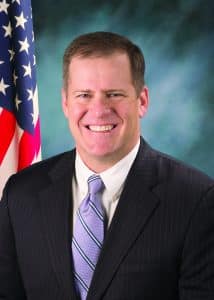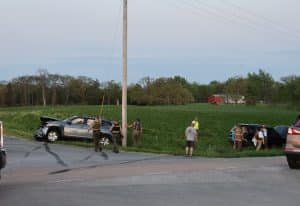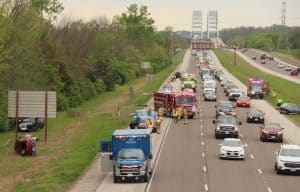Schimpf talks goals

State Sen. Paul Schimpf (R-Waterloo) has announced his goals for the 2020 legislative session.
This will be his final session representing the 58th senate district because Schimpf is not running for re-election.
“A lot of times, my role up there is voting no on really bad ideas coming out of Chicago, but there are just a few special topics that I’m going to be working on,” Schimpf told the Republic-Times.
Schimpf listed five such measures. The bill that would have the most local impact would make the permitting process easier for levee and drainage districts.
After last year’s flooding, the Illinois Department of Natural Resources sent a letter to those districts saying any improvements made in response to flooding must be removed.
After blowback from the districts, the IDNR agreed the districts could file an application to allow those improvements to remain.
Schimpf decided to facilitate that process after a meeting with the Columbia Levee and Drainage District.
“I would like to see all the levee and drainage districts be able to leave their improvement in place rather than take them out,” he said.
Another bill that would be felt locally is one that would create a class of inactive permits that cost less than normal permits for port districts.
The Kaskaskia Regional Port District requested Schimpf address that matter, as it pays for shipping permits it rarely uses but not want to expire.
Schimpf said he also plans to continue working to make it easier for the KRPD to apply for grants. That measure passed the Senate last year but has not cleared the House.
The other three bills Schimpf aims to introduce would have more of a statewide impact.
One of those measures would make security employees at places like Chester Mental Health Center have the same pension benefits as corrections officers.
That would affect about 600 people statewide.
“These are the folks that deal with the Hannibal Lecters of the world,” Schimpf said. “Their jobs are as dangerous as the corrections jobs, so I think they should be treated equally.”
That will be a new effort for Schimpf.
An old issue he is taking a new approach to involves how sales tax is calculated on motor vehicle fuel.
Currently, the state charges a tax on the fuel itself and sales tax on the entire purchase.
“I have a moral problem with charging tax on tax, so my bill is going to say when we charge sales tax on motor fuel, it’s going to be calculated based on the motor fuel itself,” Schimpf explained. “It’s not going to be based on the aggregate sum.”
Schimpf attempted to address this issue last year, to no avail.
The last major bill Schimpf plans to introduce would ensure Illinois participates in the Department of Defense’s SkillBridge program.
That allows service members to gain civilian work experience through training, apprenticeships or internships during their last 180 days of service.
“This is going to be an incentive for active-duty military to stay in Illinois,” Schimpf said. “Our state certainly needs a reason for people to stay here.”
These are not the only bills Schimpf will introduce, though he said these are the major ones he reasonably expects to pass.
Overall, Schimpf predicted this session will not be as busy as last year’s historic session, though he said he is “very concerned” about potential comprehensive energy legislation.
“Some of the environmental groups have said their goal is to basically shut down the coal plants we have in southern Illinois, so that’s something I’m very concerned about,” he said.
Although it is his last session, Schimpf said he believes he can make a difference, though he is concerned about the state’s future.
“I think Illinois is on the wrong path,” he said. “We’re on the path that seeks prosperity through increased government spending and expansive government. I don’t think that’s the way Illinois will be able to solve long-term problems.”
Still, Schimpf said Illinois has the people and resources to fix the state’s issues.
“I’m never going to give up on Illinois,” Schimpf said.






